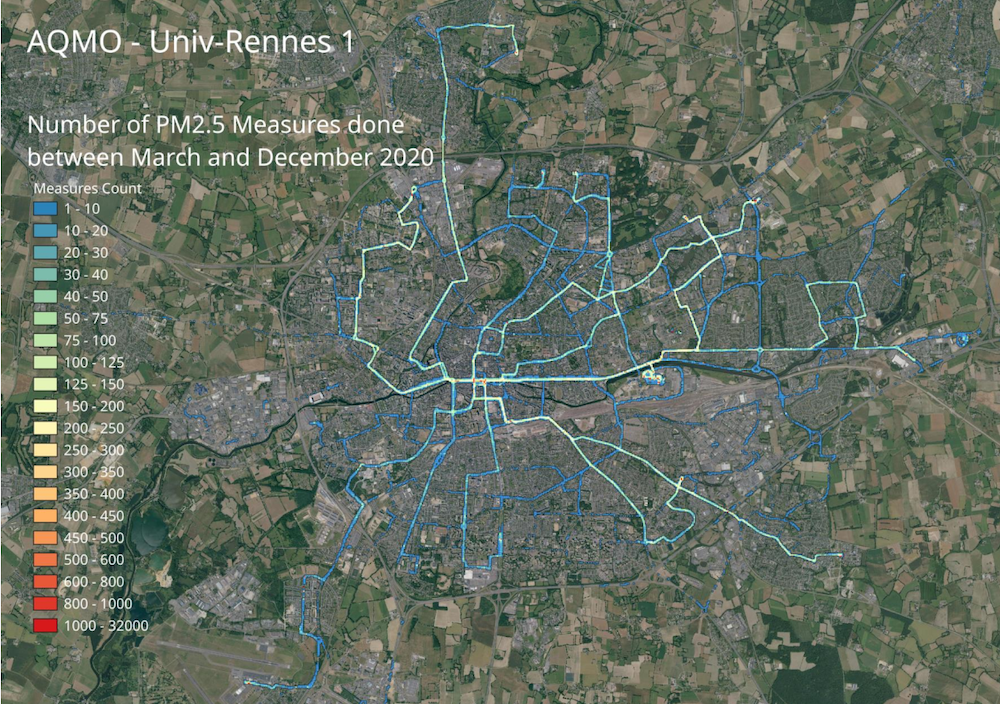Particle Matter Measurements (AQMO_SV)
Identifier: http://doi.org/10.34723/x3j9-ma13
Description: These data are collected by mobile sensors set up on bus bodies. The data acquisition is performed every 10 seconds. This has been produced by the AQMO project funded by the Connecting Europe Facility (CEF).
A RDF description of the data set is available here: http://data.irisa.fr/rdf/description_AQMO_SV.rdf
More information on AQMO here http://aqmo.irisa.fr/fr/accueil/
Keyword: construction and transport, earth and related environmental sciences, information and communication technology, public sector innovation, sensor values, air pollution, smart cities.
Publisher: IRISA is a French research laboratory in the field of computer science and information technologies. Structured into seven scientific departments, the laboratory is a research center of excellence with scientific priorities such as bioinformatics, systems security, new software architectures, virtual reality, big data analysis and artificial intelligence
Publisher link: https://www.data.gouv.fr/organizations/5f968ef7de2573fa00de8559/
ContactPoint: François Bodin
Homepage: http://data.irisa.fr/
Language: en
License:
https://www.etalab.gouv.fr/licence-ouverte-open-licence
Themes: http://eurovoc.europa.eu/2522, http://eurovoc.europa.eu/2527
MediaType: https://www.iana.org/assignments/media-types/application/sensml+json
Issued: 2020-10-26
Modified: 2020-12-01
Version: 2020
Spatial: Rennes, France, {“bbox”: [ -1.96327,47.93192,-1.46558,48.30684]}
Temporal: 2020-04-01,2020/12/01
Service: https://data.aqmo.org/
ServesDataset: https://data.aqmo.org/
Format: json
This dataset gathers sensor values (AQMO_SV) that encompass the following data fields:
- PM10 value
- PM2.5 value
- PM1 value (optional)
- Timestamp
- Sensor identification
- Localisation of the measurement (GPS coordinate)
- Temperature in Celsius degrees (optional)
- Percentage of humidity (optional).
The access (RESTRICTED) to the real-time visualisation and access platform at https://data.aqmo.org/
The access to sample data (RESTRICTED):
- 2020/04/01 to 2020/05/01 (1,4M): https://data.aqmo.org/db/dump_dev_aqmoinfra_data_2020_04_01-00h00to2020_05_01-00h00.json.xz
- 2020/05/01 to 2020/06/01 (4,1M): https://data.aqmo.org/db/dump_dev_aqmoinfra_data_2020_05_01-00h00to2020_06_01-00h00.json.xz
- 2020/06/01 to 2020/07/01 (6,0M): https://data.aqmo.org/db/dump_dev_aqmoinfra_data_2020_06_01-00h00to2020_07_01-00h00.json.xz
- 2020/07/01 to 2020/08/01 (6,0M): https://data.aqmo.org/db/dump_dev_aqmoinfra_data_2020_07_01-00h00to2020_08_01-00h00.json.xz
- 2020/08/01 to 2020/09/01 (5,2M): https://data.aqmo.org/db/dump_dev_aqmoinfra_data_2020_08_01-00h00to2020_09_01-00h00.json.xz
- 2020/09/01 to 2020/10/01 (4,4M): https://data.aqmo.org/db/dump_dev_aqmoinfra_data_2020_09_01-00h00to2020_10_01-00h00.json.xz
- 2020/10/01 to 2020/11/01 (6,6M): https://data.aqmo.org/db/dump_dev_aqmoinfra_data_2020_10_01-00h00to2020_11_01-00h00.json.xz
- 2020/11/01 to 2020/12/01 (9,2M): https://data.aqmo.org/db/dump_dev_aqmoinfra_data_2020_11_01-00h00to2020_12_01-00h00.json.xz
The Json schema is available here : https://data.aqmo.org/schemas/geojson

SynPaFlex-Corpus
DOI: 10.34723/gjxq-ch96
This resource is an expressive French audiobooks corpus containing eighty seven hours of good audio quality speech, recorded by a single amateur speaker reading audiobooks of different literary genres. This corpus departs from existing corpora collected from audiobooks since they usually provide a few hours of mono-genre and multi-speaker speech. The motivation for setting up such a corpus is to explore expressiveness from different perspectives, such as discourse styles, prosody, and pronunciation, and using different levels of analysis (syllable, prosodic and lexical words, prosodic and syntactic phrases, utterance or paragraph). This will allow developing models to better control expressiveness in speech synthesis, and to adapt pronunciation and prosody to specific discourse settings (changes in discourse perspectives, indirect vs. direct styles, etc.). To this end, the corpus has been annotated automatically and provides information as phone labels, phone boundaries, syllables, words or morpho-syntactic tagging. Moreover, a significant part of the corpus has also been annotated manually to encode direct/indirect speech information and emotional content. The corpus is already usable for studies on prosody and TTS purposes and is available to the community.
The corpus is available at: https://www.ortolang.fr/market/corpora/synpaflex-corpus